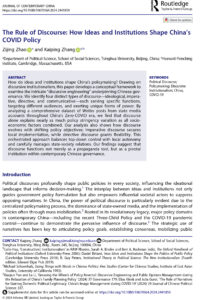
Zijing Zhao & Kaiping Zhang
Journal of Contemporary China
Abstract: How do ideas and institutions shape China’s policymaking? Drawing on discursive institutionalism, this paper develops a conceptual framework to examine the intricate “discursive engineering” underpinning Chinese governance. We identify four distinct types of discourse—ideological, imperative, directive, and communicative—each serving specific functions, targeting different audiences, and exerting unique forms of power. By analyzing a comprehensive dataset of Weibo posts from state media accounts throughout China’s Zero-COVID era, we find that discourse alone explains nearly as much policy stringency variation as all socio-economic factors combined. Our analysis also shows how discourse evolves with shifting policy objectives: imperative discourse secures local implementation, while directive discourse grants flexibility. This orchestrated approach balances top-down control with local autonomy and carefully manages state-society relations. Our findings suggest that discourse functions not merely as a propaganda tool, but as a pivotal institution within contemporary Chinese governance.
About the author: Kaiping Zhang is a HYI Visiting Scholar from 2024-25.
